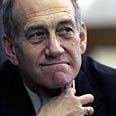
Poll: Kadima continues to drop
Less than one month before elections, Yedioth Ahronoth poll reveals Kadima lost five Knesset seats in three weeks ; Labor up by one seat, Likud down by one seat
Despite the drop, 94 percent of the respondents said that the recent publications on Kadima Chairman Ehud Olmert have not changed their position toward the party.
According to the survey, Labor Party gained 20 Knesset seats, up one seat compared to last week's poll. Likud dropped by one seat, receiving only 15 Knesset seats.
The poll was conducted before the Likud Central Committee decided to pass the party's Knesset list through vote by all Likud members. Therefore, there may have been a change in the respondents' support for the Likud following the move, which is not reflected in the current survey.
Some 83 percent of the respondents said that that the Likud Committee's decision would not affect their support for the party.
Shas remained stable with 10 Knesset seats, while the right-wing National Union-National Religious Party and Israel Our Home party each received nine Knesset seats. United Torah Judaism was also up by one seat to six Knesset seats.
According to the poll, Meretz won five seats. As for the Arab parties, Hadash United Arab List-Ta'al both received three seats, while the National Democratic Assembly won two seats.
More undecided voters
The poll also reveals that 12 percent of the voters, worth 14 Knesset seats, said that they have yet to decide which party to vote for.
Up to two weeks ago, the portion of the undecided voters was smaller. However, it is a well-known phenomenon that the number of undecided voters tends to increase as the elections approach, and decreases a few days before Election Day.
The survey respondents were also asked whether there is a chance that the election broadcast would change their voting.
About 70 percent said that there is no chance they would change their voting following the broadcasts, while 19 percent said there is a small chance, 8 percent said that there is a moderate chance, and only 3 percent said that there is a big chance that they would change their voting after watching the broadcasts.










